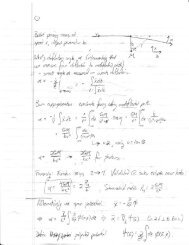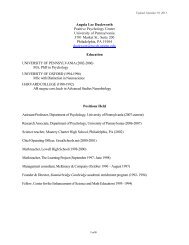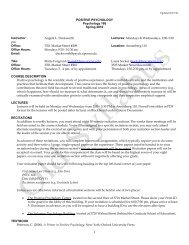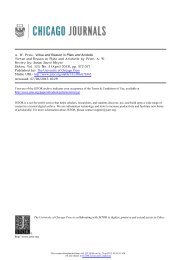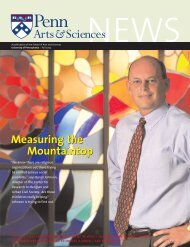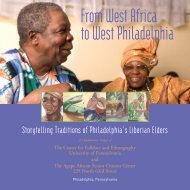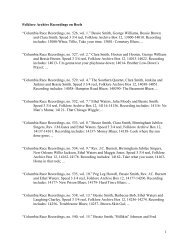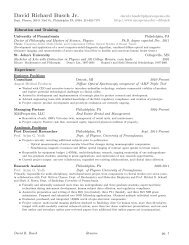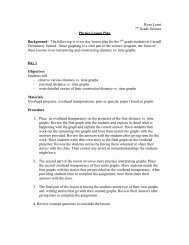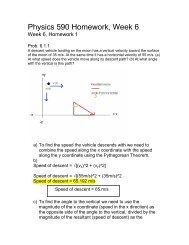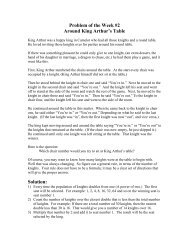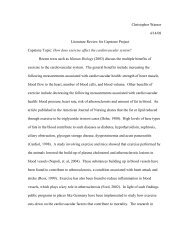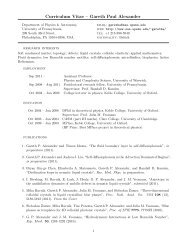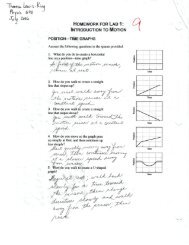PENN SUMMER - University of Pennsylvania
PENN SUMMER - University of Pennsylvania
PENN SUMMER - University of Pennsylvania
Create successful ePaper yourself
Turn your PDF publications into a flip-book with our unique Google optimized e-Paper software.
CheM 245 920 TWr 10:00am–1:30pm Kozlowski<br />
Experimental Organic Chemistry I<br />
Prerequisite(s): CHEM 241 / Co-requisite(s): CHEM 242<br />
A basic laboratory course in which both the theoretical and practical<br />
aspects <strong>of</strong> a variety <strong>of</strong> organic reactions and multistep syntheses<br />
are emphasized. Modern chromatographic, instrumental, and spectroscopic<br />
techniques are applied to experimental organic chemistry.<br />
Course should be taken concurrently with CHEM 242 or in the semester<br />
immediately following. For safety reasons students will not be<br />
permitted to wear contact lenses in the laboratory. PLEASE NOTE<br />
THE FOLLOWING: For the Summer and LPS <strong>of</strong>fering <strong>of</strong> CHEM<br />
245, it is a 2-semester course. Part 1 is taken in the first term for 0.0<br />
CU and then Part 2 is taken in the second term immediately following<br />
the first for 1.0 CU.<br />
CineMa STUDieS<br />
CIne 202 920 TBa Baumli<br />
Understanding Cinematic Adaptations:<br />
21st-Century Literacy<br />
Avid fans <strong>of</strong> a particular novel <strong>of</strong>ten eagerly await a film version. These<br />
same enthusiasts equally <strong>of</strong>ten come away disappointed by the translation<br />
<strong>of</strong> their favorite book into an altogether different work <strong>of</strong> art.<br />
Even though 85% <strong>of</strong> blockbuster movies are adaptation <strong>of</strong> novels and<br />
short stories, the viewing audience seldom can judge a film version <strong>of</strong><br />
a novel by any other criterion than faithfulness to the original. More<br />
and more, true literacy involves the capability to evaluate a work<br />
across several media. Moving away from this sort <strong>of</strong> “fidelity studies,”<br />
this interdisciplinary course will examine adaptations as works<br />
<strong>of</strong> art in their own right. Using recent scholarship from theorists <strong>of</strong><br />
adaptation including Deborah Cartmell, Tim Corrigan, Millicent<br />
Marcus, James Naremore, and Imelda Whelan, students will be introduced<br />
to the relatively new field <strong>of</strong> film adaptation studies. Further,<br />
through close examination <strong>of</strong> film and text, students will gain new<br />
analytic tools to evaluate both the literature they read and the movies<br />
they watch. We will look at the Coen Brothers’ transformation <strong>of</strong><br />
Homer’s Odyssey into O Brother, Where Art Thou?, Danny Boyle’s incorporation<br />
<strong>of</strong> Hindu and Greek myth into Slumdog Millionaire, Francis<br />
Ford Coppola’s rendering <strong>of</strong> Joseph Conrad’s Heart <strong>of</strong> Darkness into<br />
Apocalypse Now Redux, and Baz Luhrman’s Bollywood version <strong>of</strong> the<br />
Orpheus myth into Moulin Rouge. We will also consider adaptations<br />
across new media, such the film renditions <strong>of</strong> graphic novels like Alan<br />
Moore’s V for Vendetta, Dan Clowe’s Ghost World, or Marjane Satrapi’s<br />
Persepolis; and music videos, like The Smashing Pumpkins’ version <strong>of</strong><br />
Federico Fellini’s adaptation <strong>of</strong> Apuleius’s The Satyricon, or OutKast’s<br />
parody <strong>of</strong> A Hard Day’s Night. The course will require two 5 page papers<br />
and a final examination. Outside film viewing required.<br />
CIne 202 921 TBa Fiumara<br />
Edgar Allan Poe and the Cinema<br />
Last year marked the bicentennial <strong>of</strong> the birth <strong>of</strong> Edgar Allan Poe<br />
and his cultural popularity and influence show no signs <strong>of</strong> abatement.<br />
IMDb lists over 200 films based on Poe’s oeuvre and what other literary<br />
figure can boast a pr<strong>of</strong>essional sports team named in their honor<br />
(Baltimore Ravens)? This course will consider a number <strong>of</strong> canonical<br />
Poe stories and poems and the long history <strong>of</strong> cinematic adaptations<br />
<strong>of</strong> these classic works. We will look at popular horror films such<br />
as Murders in the Rue Morgue (1932) and Roger Corman’s Pit and the<br />
Pendulum (1961), but will also pay attention to Poe’s important influence<br />
on the avant-garde (German Expressionism, French Surrealism)<br />
and the stop-motion animation <strong>of</strong> Jan Svankmajer and Tim Burton.<br />
We will also consider Poe’s continued presence in popular culture by<br />
looking at television parodies (The Simpsons), forensic crime dramas<br />
(CSI), comic books (Batman Nevermore), and possibly a class trip to the<br />
Poe House in Philadelphia.<br />
CoMMUniCaTionS<br />
CoMM 123 920 T 5:30pm–8:40pm rodriguez<br />
Communication and Popular Culture<br />
Popular culture has been alternately dismissed as mere trivia and<br />
condemned as propaganda, a tool <strong>of</strong> mass deception. This course introduces<br />
students to some <strong>of</strong> the most important critiques <strong>of</strong> culture<br />
since the 1930s and to different kinds <strong>of</strong> research that can help us<br />
understand popular culture and its effects. Students will investigate<br />
how different cultural forms communicate ideas about the world.<br />
Overarching questions for the course include: How do various popular<br />
culture forms represent social life? Why do we consume popular<br />
culture in the ways that we do? How can we look at popular culture<br />
to understand the world better, including our place in the world? To<br />
answer these questions, we will explore a range <strong>of</strong> media and genres,<br />
including television, film, advertising, music, books, magazines, and<br />
the Internet. The course develops critical reading skills that can be<br />
applied to both scholarly and popular texts.<br />
CoMM 130 920 Tr 5:30pm–8:40pm Penney<br />
Introduction to Mass Media and Society<br />
Fulfills Society Sector<br />
How might we think about the legal, political, economic, historical,<br />
and “cultural” considerations that shape what we watch on TV, read in<br />
books, stare at in billboards? What ideas are relevant for examining<br />
the enormous changes in the mass media system and the consequences<br />
<strong>of</strong> those changes? The aim <strong>of</strong> this course is to begin to answer these<br />
questions by acquainting you with the workings <strong>of</strong> American mass<br />
media as an integral part <strong>of</strong> American society.<br />
CoMM 226 920 Tr 1:00pm–4:10pm roodhouse<br />
Introduction to Political Communication<br />
This course is an introduction to the field <strong>of</strong> political communication,<br />
conceptual approaches to analyzing communication in various<br />
forms, including advertising, speech making, campaign debates, and<br />
candidates’ and <strong>of</strong>fice-holders’ uses <strong>of</strong> news. The focus <strong>of</strong> this course<br />
is on the interplay in the U.S. between television and politics. The<br />
course includes a history <strong>of</strong> televised campaign practices from the<br />
1952 presidential contest through the election <strong>of</strong> 2008.<br />
<strong>SUMMER</strong> SESSIOn II • JULY 6–AUgUST 13, 2010 29



